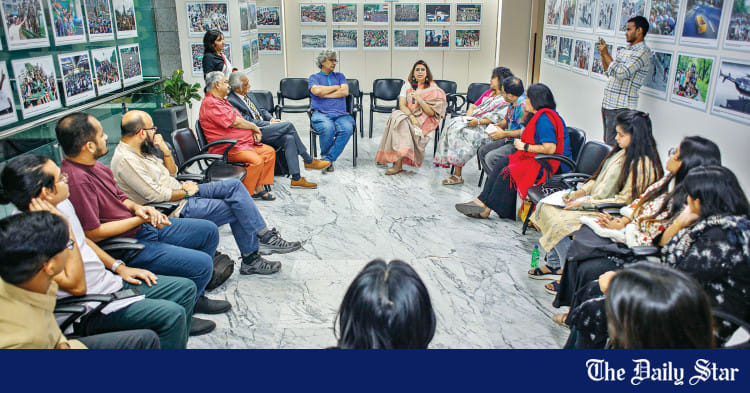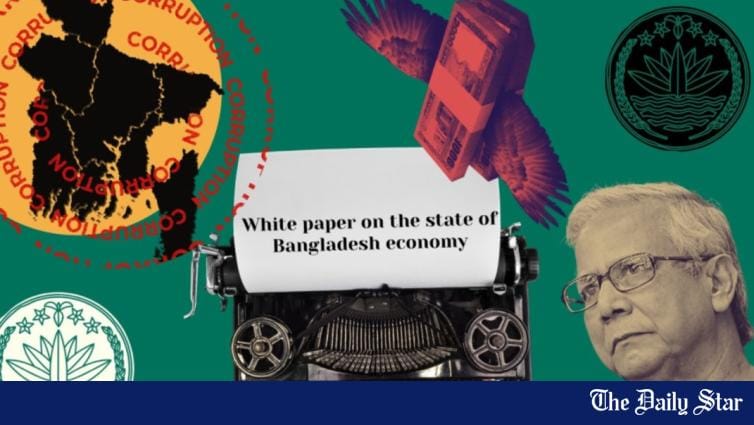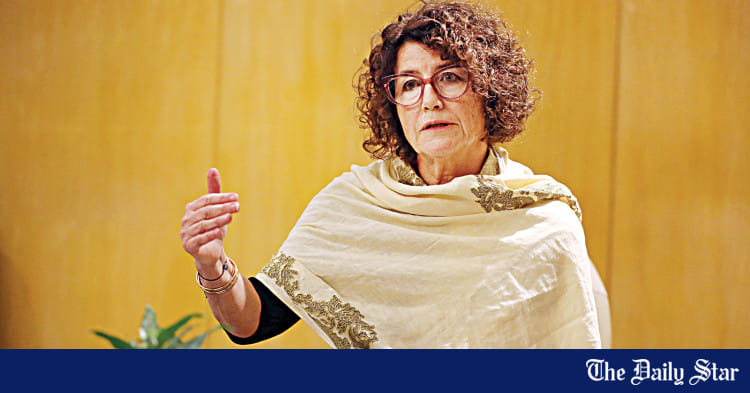Saif
Senior Member
- Joined
- Jan 24, 2024
- Messages
- 15,663
- Reaction score
- 7,935
- Nation

- Axis Group


Institutional reform needed for an inclusive Bangladesh
Ultimately, the battle between extractive and inclusive institutions is not just a fight over resources; it is a fight over the future direction of the country.
Institutional reform needed for an inclusive Bangladesh

For Bangladesh the student movements represent a beacon of hope for more inclusive, equitable development. FILE PHOTO: PALASH KHAN
This year's Nobel laureates in economic sciences—Daron Acemoglu, Simon Johnson, and James Robinson—have demonstrated the importance of societal institutions for a country's prosperity. Societies with a poor rule of law as well as exploitative institutions struggle to generate growth or improve living standards. The Nobel laureates' research helps us understand how Bangladesh, trapped in extractive institutions inherited from its colonial past, failed to achieve the desired magnitude of prosperity after independence.
Extractive institutions, which concentrate power and resources among a select few, often hinder widespread economic opportunities. These institutions prioritise the interests of political elites, military leaders or certain economic groups, creating a system where wealth and decision-making authority are hoarded at the top. In such settings, most people are excluded from the economic and political benefits that promote growth and innovation. As a result, inequality grows, social mobility diminishes, and opportunities for broader development are stifled. In Bangladesh, the economic system of the past 16 years served as an example of such extractive institutions, where the primary beneficiaries were a handful of citizens and their descendants—political elites, bureaucrats and business conglomerates who maintained control over the country's resources. This era largely ended in August this year. To understand how extractive institutions might transition to more inclusive ones in Bangladesh's context, we can look at students' movements that, by protesting against discrimination and demanding equal socioeconomic opportunities, have challenged economic and power structures.
Historically, popular uprisings and social movements have played a vital role in shifting extractive institutions toward inclusivity by amplifying the voices of marginalised groups and pressuring governments to implement changes. For example, the 1952 Language Movement, which secured Bangla as the official language, and the 1990 movement, which led to the end of military rule and restored democracy in the country, are both pivotal in Bangladesh's history as they highlight the role of youth activism in confronting entrenched power structures. Most recently, students mobilised around critical issues such as road safety in 2018 and civil service quota reforms in 2018 and 2024.
The 2018 Road Safety Movement began after two students were tragically killed in a hit-and-run incident. It quickly grew into a nationwide outcry against the poor governance of our roads. The civic community became increasingly vocal about the negligence, corruption, and lack of accountability in the transport sector. Similarly, during the 2018 and 2024 quota reform protests, students successfully pressured the government to reform the civil service recruitment system, reducing job quotas reserved in favour of certain groups. These quotas, which disproportionately benefited certain families and politically connected individuals, were seen as barriers to merit-based recruitment and career advancement. The quota reform movements were a small but meaningful step towards a more inclusive system that aims to level the playing field for all citizens, regardless of their background.
Bangladesh's student movements are more than just isolated incidents of unrest—they symbolise a broader, structural challenge to the extractive institutions that dominate the political and economic landscape. If student movements continue to push for reforms addressing employment opportunities, social inequality, and corruption, they are essentially calling for a shift from extractive practices to more inclusive systems. The success of these movements hinges on their ability to connect with other discontented groups and sustain pressure on the government.
In countries like Tunisia, Egypt and South Korea, student-led movements became catalysts for regime change and reforms when they gained momentum and aligned with other social groups. In Bangladesh, the potential for such a shift exists. As student movements continue to grow, they could play a crucial role in transitioning the country to a more inclusive and participatory society. The outcome of this transition would depend on the resilience of these movements and the willingness of the ruling elite to compromise or face political and economic upheaval.
Ultimately, the battle between extractive and inclusive institutions is not just a fight over resources; it is a fight over the future direction of the country. Inclusive institutions tend to foster economic growth, innovation, and political stability by allowing broader participation in decision-making and ensuring that opportunities are available to all citizens. For Bangladesh, which continues to grapple with high levels of inequality, corruption and governance challenges, the student movements represent a beacon of hope for more inclusive, equitable development.
By challenging the status quo—whether in economics, education, governance, or public safety—students in Bangladesh are confronting the extractive nature of the system. If these movements garner broader support and align with other social forces, they could lead to reforms that make institutions more transparent and accountable. This mirrors the broader theoretical process in which social mobilisation, crises, elite conflict, and external pressures contribute to the transformation from extractive to inclusive institutions.
Dr Shamsul Arifeen Khan Mamun is a professor of economics and a member of the BCS general education cadre. He is currently attached to the Directorate of Secondary and Higher Education (DSHE) under the Ministry of Education.
For Bangladesh the student movements represent a beacon of hope for more inclusive, equitable development. FILE PHOTO: PALASH KHAN
This year's Nobel laureates in economic sciences—Daron Acemoglu, Simon Johnson, and James Robinson—have demonstrated the importance of societal institutions for a country's prosperity. Societies with a poor rule of law as well as exploitative institutions struggle to generate growth or improve living standards. The Nobel laureates' research helps us understand how Bangladesh, trapped in extractive institutions inherited from its colonial past, failed to achieve the desired magnitude of prosperity after independence.
Extractive institutions, which concentrate power and resources among a select few, often hinder widespread economic opportunities. These institutions prioritise the interests of political elites, military leaders or certain economic groups, creating a system where wealth and decision-making authority are hoarded at the top. In such settings, most people are excluded from the economic and political benefits that promote growth and innovation. As a result, inequality grows, social mobility diminishes, and opportunities for broader development are stifled. In Bangladesh, the economic system of the past 16 years served as an example of such extractive institutions, where the primary beneficiaries were a handful of citizens and their descendants—political elites, bureaucrats and business conglomerates who maintained control over the country's resources. This era largely ended in August this year. To understand how extractive institutions might transition to more inclusive ones in Bangladesh's context, we can look at students' movements that, by protesting against discrimination and demanding equal socioeconomic opportunities, have challenged economic and power structures.
Historically, popular uprisings and social movements have played a vital role in shifting extractive institutions toward inclusivity by amplifying the voices of marginalised groups and pressuring governments to implement changes. For example, the 1952 Language Movement, which secured Bangla as the official language, and the 1990 movement, which led to the end of military rule and restored democracy in the country, are both pivotal in Bangladesh's history as they highlight the role of youth activism in confronting entrenched power structures. Most recently, students mobilised around critical issues such as road safety in 2018 and civil service quota reforms in 2018 and 2024.
The 2018 Road Safety Movement began after two students were tragically killed in a hit-and-run incident. It quickly grew into a nationwide outcry against the poor governance of our roads. The civic community became increasingly vocal about the negligence, corruption, and lack of accountability in the transport sector. Similarly, during the 2018 and 2024 quota reform protests, students successfully pressured the government to reform the civil service recruitment system, reducing job quotas reserved in favour of certain groups. These quotas, which disproportionately benefited certain families and politically connected individuals, were seen as barriers to merit-based recruitment and career advancement. The quota reform movements were a small but meaningful step towards a more inclusive system that aims to level the playing field for all citizens, regardless of their background.
Bangladesh's student movements are more than just isolated incidents of unrest—they symbolise a broader, structural challenge to the extractive institutions that dominate the political and economic landscape. If student movements continue to push for reforms addressing employment opportunities, social inequality, and corruption, they are essentially calling for a shift from extractive practices to more inclusive systems. The success of these movements hinges on their ability to connect with other discontented groups and sustain pressure on the government.
In countries like Tunisia, Egypt and South Korea, student-led movements became catalysts for regime change and reforms when they gained momentum and aligned with other social groups. In Bangladesh, the potential for such a shift exists. As student movements continue to grow, they could play a crucial role in transitioning the country to a more inclusive and participatory society. The outcome of this transition would depend on the resilience of these movements and the willingness of the ruling elite to compromise or face political and economic upheaval.
Ultimately, the battle between extractive and inclusive institutions is not just a fight over resources; it is a fight over the future direction of the country. Inclusive institutions tend to foster economic growth, innovation, and political stability by allowing broader participation in decision-making and ensuring that opportunities are available to all citizens. For Bangladesh, which continues to grapple with high levels of inequality, corruption and governance challenges, the student movements represent a beacon of hope for more inclusive, equitable development.
By challenging the status quo—whether in economics, education, governance, or public safety—students in Bangladesh are confronting the extractive nature of the system. If these movements garner broader support and align with other social forces, they could lead to reforms that make institutions more transparent and accountable. This mirrors the broader theoretical process in which social mobilisation, crises, elite conflict, and external pressures contribute to the transformation from extractive to inclusive institutions.
Dr Shamsul Arifeen Khan Mamun is a professor of economics and a member of the BCS general education cadre. He is currently attached to the Directorate of Secondary and Higher Education (DSHE) under the Ministry of Education.











































